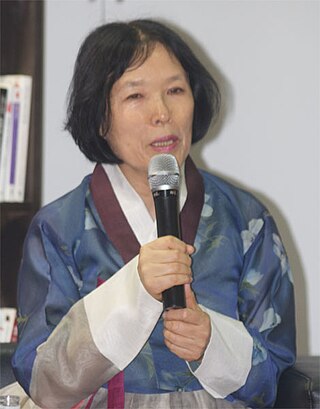Works in Translation
| | This section is empty. You can help by adding to it. (January 2014) |
Lee Mun Ku | |
|---|---|
| Born | April 12, 1941 |
| Died | February 25, 2003 (aged 61) |
| Language | Korean |
| Nationality | South Korean |
| Korean name | |
| Hangul | 이문구 |
| Hanja | |
| Revised Romanization | I Mungu |
| McCune–Reischauer | I Munku |
Lee Mun Ku (Hangul: 이문구) was a South Korean novelist. [1]
Lee Mun Ku was born in Boryeong, South Chungcheong Province, South Korea. [2] Lee graduated from Sorabol Arts College with a degree in creative writing. Lee edited various magazines and publishing companies, including Shilchon Munhak-sa and was a founding member and officer of the Freedom Activist Writers' Association as well as being an officer of the League of Korean Writers and serving as the chairman of the Liaison Committee of the Korean Writer's Association and director of the Korean International PEN Club. [3]
While he was a student in the Creative Writing Department at Sorabol College of Arts, his talent was recognized by the influential fiction writer Kim Dongri, and Lee Mungu published his first stories, “Dagalla Monument” (Dagalla bulmangbi, 1965) and “White Waves” (Baekgyeol, 1966), in Contemporary Literature (Hyundae Munhak) at his recommendation. After graduating from college, Lee Mungu worked for several literary journals, including Literature Monthly (Wolgan munhak), Korean Literature (Hanguk munhak), and Literature of Praxis (Silcheon munhak), and joined the Association of Writers for Literature of Freedom and Practice (Jayu silcheon munin hyeobuihoe). [4]
The subject of Lee's literary explorations is agrarian Korean society in transition. From very early on in his career, Lee revealed his interest in the harsh reality of Korean farming and fishing villages and the lives of rural people alienated by industrialization. Stories like “This World of Woe” (Yi pungjin sesangeul) and “The Cow” (Amso) offer, for example, realistic slices of contemporary rural life and an insider's look at the humble dreams and daily frustrations of farmers in these villages. The Dream of Everlasting Sorrow (Janghanmong, 1972), on the other hand, focuses on the urban poor. Countryfolk dislocated in the process of industrialization and forced to work as day laborers, the characters are now far away from the land of their ancestral home. An undercurrent of longing flows through the text. [4]
Nostalgia for a place and way of life that no longer exist also lies at the heart of The Ballad of Kalmori (Gwanchon supil, 1977). The volume contains retrospective accounts of scenes and persons from the author's childhood in Gwanchon Village. Lee provides sketches of a vanishing ethos connected with the Korean countryside a way of life based on hospitality, reciprocity, and fundamental reverence for the living. For these virtues, critics agree that The Ballad of Kalmori is a text worthy of being called the highest literary tribute to the lost world of traditional Korea. [4]
Lee's concern with the impact of industrialization on Korean countryside continues in Our Neighborhood. Whereas The Ballad of Kalmori is somewhat an idealized attempt to recollect a past way of life in rural communities, Our Neighborhood discusses contemporary realities faced by Korean farmers. The village of Our Neighborhood is a place invaded by three-fold pollution: contamination of the natural environment; destruction of the balance in local economy by the infiltration of industrial capital; and a growing trend toward mutual distrust among the villagers themselves. In the process, Lee articulates a sharp critique of the network of forces contributing to the material and spiritual destitution of rural communities. [4]
| | This section is empty. You can help by adding to it. (January 2014) |
Collections
Novels
Stories
Yoo Hyeonjong is a South Korean novelist whose works of dramatic historical fiction are well known in his native country.

Kim Won-il is a South Korean writer.

Mun Jeonghui is a South Korean poet.
Yi Hocheol was a South Korean writer who won several awards.

Seo Yeong-eun is a South Korean writer.
Song Giwon (Hangul: 송기원 is a modern South Korean novelist, who has won several awards, and been arrested for suspected treason.
Jeon Sang-guk (Korean: 전상국) is a South Korean writer known for his masculine writing style.
Yi Seongbok is a South Korean poet.
Sim Yunkung is a South Korean writer.
Lee Ki-ho is a South Korean writer.
Kim Haki (Korean: 김하기) is a modern South Korean writer and ex political-prisoner.
Han Malsook is a South Korean writer.
Lee SungBoo was a South Korean poet and novelist.
Moon Deoksu was a South Korean poet.
Song Gisuk was a South Korean writer of novels, short stories, and essay.
Song Sugwon, also Song Soo-Kwon, was a modern South Korean writer.
Seong Changyeong was a modern South Korean poet.
Lee Jangwook is a South Korean poet, novelist, and critic.

Jang Seoknam is a South Korean poet.
Jeon Sungtae is a South Korean writer.